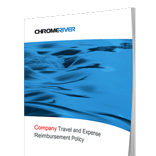We recently talked about the need for your expense management technology solution to keep up with the changing tides of business, as your organisation grows and evolves. However, that’s not the only part of your overall expense management ecosystem that you need to ensure keeps pace with the times. Your organisation’s travel and expense policy must also ensure that it stays updated, to support the requirements of both the employer and also those who need to submit expense reports.
Related: Why Your Expense Policy Should Follow Your Business Travellers (and Not Just the Other Way Around)
For example, has your organisation embraced (or even addressed) solutions such as Uber/Lyft and Airbnb? While it may seem that the decision to adopt these solutions may be straightforward for travel managers, it can be somewhat more complex. What about negotiated rates that your organisation may have with hotel chains – will they be adversely impacted by travellers staying in shared accommodation? There is also duty of care to consider – if your company does allow employees to stay in these types of lodging, what restrictions should you place on whether they are allowed to share with others?
According to a recent survey that we commissioned of corporate travel and finance professionals, shared economy services aren’t yet a firm fixture of corporate travel policies, even though few organisations specifically prohibit their use. While more than 50 percent of respondents say that Uber/Lyft use is specifically addressed within their travel and expense policy, less than 20 percent of respondents said the same for Airbnb-type lodging. No respondents said that their organisation has a policy that prohibits ride-sharing, only three percent formally ban the use of share-lodging services, and 54 percent of respondents said that their organisation has no restrictions in place regarding who they can share with.
The biggest reason behind moving toward these new services is the cost savings that they offer, cited by a third of respondents. Flexibility and ease of use were each cited as the top reason by 23% of respondents, with employee feedback and preference at 18%.
The latest innovation in urban transport, however, is still to gain meaningful acceptance among corporates. Only 11% of those surveyed said that their organisation allows employees to use electric scooters while on business travel, with 43% saying they are not allowed, and a further 46% being unsure of their organisation’s policy for scooter use.
Related: Creating an Expense Policy that Helps, Not Hinders, Your Employees
Is it time that your travel expense got a refresh? Is your organisation among the quarter that hasn’t updated its policy in the past two years? Download our expense policy template to make sure your organisation follows the latest best practices for providing an employee-friendly experience, while maintaining effective cost-control processes.

Search
Subscribe
Latest Posts
- UK Finance Leaders Reveal Biggest Concerns for the Post-COVID Recovery
- 9 Signs it’s Time to Switch Expense Management Systems
- How We Did It: Supporting Front Line Healthcare Workers During the COVID-19 Outbreak
- Managing Traveller Safety in a Post-Coronavirus World
- Controlling Car Rental Spend With Car FOLIO
Posts by Category
Our choice of Chrome River EXPENSE was made in part due to the very user-friendly interface, easy configurability, and the clear commitment to impactful customer service – all aspects in which Chrome River was the clear winner. While Chrome River is not as large as some of the other vendors we considered, we found that to be a benefit and our due diligence showed that it could support us as well as any large players in the space, along with a personalized level of customer care.
We are excited to be able to enforce much more stringent compliance to our expense guidelines and significantly enhance our expense reporting and analytics. By automating these processes, we will be able to free up AP time formerly spent on manual administrative tasks, and enhance the role by being much more strategic.
